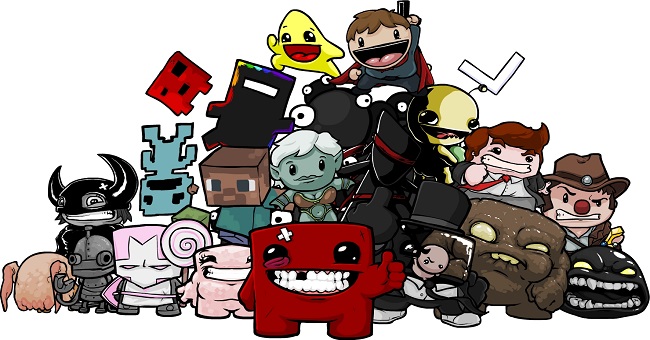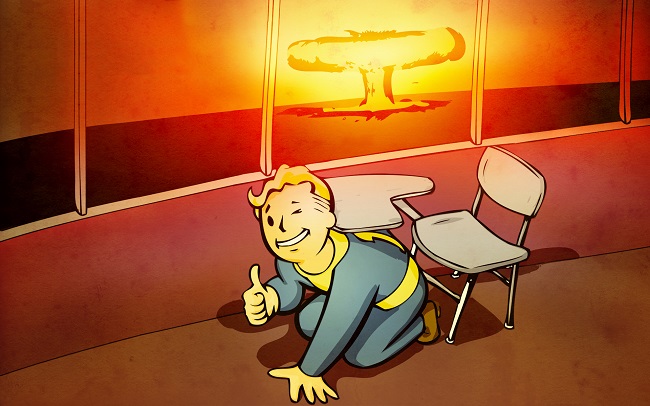
During PAXAus earlier this month, Nick and I caught up with Ron Curry – CEO of the Interactive Games and Entertainment Association. Along with Dr Jeffrey Brand, professor of Communication and Media at Bond University, and Managing Director of Teslyte Foad Fadaghi, Ron hosted a panel at PAXAus titled “Games Industry Trends – Beyond 2014.” It was an interesting insight into the global games industry, particularly in Australia, based on data collected over the past nine years and several reports which have been released. Afterwards, Nick and I had the chance to sit down with Ron for a while and ask him some questions about where he thinks the future of gaming is headed. Also about where it’s been. Gaming gets around a lot.

During the panel, you said that the data was collected from surveys, how were those surveys conducted? Just asking people walking around in the street, through websites, at events?
Ron: Bond University do it through Morgan Research, I think – and that’s why we did it through [Bond University], because we wanted an impartial 3rd party performing that research. Everything’s sort of at arms length with us, as well, because otherwise peoples’ reactions will be “Well, you did the research and you analyzed it and you published it out – how can we know it’s unbiased?” We need to make sure that anything we present is beyond reproach so that when we present it to government bodies and the like, they won’t be able to dismiss it so easily.
So, when the research has been collected does that mean Bond University analyses it as well?
Ron: Yeah, they do everything – the report comes out, they do the designing and writing of the report. We’ll talk to them about what it should cover and say things like, “Hey, it would be great to have a page about this, or infographics on this;” but what comes out the other end is totally out of our hands. If we don’t like it? Well… too bad.
Were there any statistics from this latest report that you weren’t expecting? Things that surprised you?
Ron: Once you’ve done five of them, over a ten year period, you don’t really see a lot of sudden big changes, but small incremental ones. But last year it was how quickly that 50-plus group were growing, and how many were engaging in games, that was surprising. They’re the influences – when you’re talking legislation and policies, when you’re talking government, they’re part of the age group that are engaging with games. They’re who we need to be communicating with.

And when you say “games,” you’re referring to any game from any platform?
Ron: That’s right.
Would you say then that the number of mobile gamers or people who play “casual” games outnumber people who play games by more “traditional” means, such as PC or console?
Ron: That’s something we’ll start looking at this year, because we’ve found that there’s actually a lot of overlap. There’s two reasons for that: PC and console gaming tends to be something you go to do, whereas mobile or tablet gaming is something you tend to do while you’re going to do something else. Jeff called it “snack gaming,” like it’s something you do between meals or while you’re watching TV. So, yeah, there might be something like that happening but we’ll be looking at it in the next report.
That concept of a person who plays games while doing something else was referred to as a “Multitasker” during the panel by Foad, what would your interpretation be of that persona?
Ron: I think because we all multitask now – I mean, I sit on the couch and watch television with a laptop or tablet in my lap, because I don’t want to watch the ads. But again, that’s also on the rare occasion I’m actually watching the television and not watching shows on my tablet, because that’s now where I consume most of my media. Not on the big 50″ television in my house anymore, it just sits there and no one uses it! My ten year old once said to me, “Well, it doesn’t do anything.”
People are playing games while they’re doing something else, watching tv or listening to the news, whatever. You know, my wife plays words with friends while watching tv, she’d tell you she’s not a gamer – but she’s playing a game.

Do you think that might be an example of how the perception of games has changed, to a point where only certain things would even be considered games?
Ron: During Jeff’s presentation in the panel you might have noticed him referring to “playing” and “players.” [IGEA] have always focused on “gaming” and “gamers,” so one thing we want to talk about in the next report is the act of playing games and who’re playing them, the gamers. Because there are people who would say “I’m a gamer and you are not,” there are others who’d say “I’m not a gamer” – but you wouldn’t sit around and say: “Are you a book reader?” Or, “Are you a TV watcher?” We just don’t do it anymore. You ask people what kind of books they listen to or what kinds of books they read; they’re enjoying the same medium, just in different ways and everyone accepts that. I don’t think we’re quite past that stage with games just yet. We’re young, Jeff was talking about that “first stage of the industry” and we’re still in that stage.
So, when you say the next report will focus on how people play games and those people themselves, will you also attempt to define what a game is? Will it try to explain that everyone considers a game, at the moment, to be different things?
Ron: I think we all inherently know that, if we go back to “What is a game?” and forget about how it’s delivered to you – we’ve been playing games for centuries. They’re not always about winning or losing they can be different, and now we’re playing games with an electronic interface and AI. So should we say that you’re only engaging with a “game” if it has a certain outcome? I don’t think so, because we play games for lots of different reasons – we play for relaxation, for socialisation, for a whole stack of reasons. So that means we’re going to have a lot of different styles of games delivered to cater to that.

Would you say that the report is trying to change peoples perceptions and help them to accept a wider definition of “games” and “gamers?”
Ron: Absolutely, we’ve been saying that for the last few years – I don’t really like the term “gamer.” It screams that it’s a special term, that we’re special and want special treatment, but at the same time we also demand to be treated the same as everyone else. Treat us maturely and with respect – we can’t have it both ways.
I was on a panel a number of years ago and we were asked to predict what games will look like in five, ten years or something. Some answers were “It’ll be thought processed” and “It’ll have these kinds of graphics,” but my answer was that I’d like to see kids walk into a classroom, sit down and their text book would be a device that delivers this interactive experience that might immerse them in some kind of knowledge quest. And, you know, it would be delivered in such a way that there’d be an educational outcome for the students. That was my view, it was too over simplistic to say “we’re gonna stay the same, just more refined.” It doesn’t have to be education either, we do a lot of work around healthcare – and the same ideas apply to that area. How can we apply game theory to provide, say, better mental health outcomes?
Would you say the reason there are people who resist these kinds of trends, maybe even deride others who try to show games as being something more, is because they’re trying to protect what they think gaming should be?
Ron: Definitely, for some it’s a very specific culture. What do we do when people try to drill into our culture?
Oh… lots of things…

Ron: Exactly, and that’s largely what it’s all about. From our role, we look at things from a consumer and culture perspective, but also from the perspective of businesses. We’ll go along to universities and give talks and say to game development students and say “You guys have some awesome skills that the wider industry want and could really benefit from.” That’s what Jeff was saying, that the majority of students don’t end up in the games making industry – they go on to work in other areas. “Sell outs,” some people call them, but they take those really smart skills and can apply them to a lot of other industries and really help them. That’s really cool.
It’s like that enzyme problem that the medical field had been having, something to do with AIDS. It was put online as a puzzle game and people were able to figure it out so much faster, looking at it from a different perspective.
So do you think then that as the medium evolves and people along with it that society will change a lot to reflect that?
Ron: I don’t think it’ll change it at the very core of things, but I remember hearing debates when I was in school about whether or not we should be watching television in classrooms – and it was still black and white back in those days. But there was debate around that medium: “Is it a good teaching tool?” or “No, it’s just garbage and they’ll just be sitting there passively,” stuff like that. But now we’re at that stage where you can’t sit through a single uni lecture without something flashing up on a screen. So, you know, is it going to change the world? No, but it’ll be a new way for us to do things.

Do you think, then, that games are going to start blending into everything we do and make it difficult to differentiate between what’s a game and what’s just something which has been “gameified?”
Ron: When you sit at home and watch, say, Game of Thrones on your television, do you consider that to be the same as watching some technical DVD on engineering? They’re using the same medium, but they’re totally different deliveries. I think we’ll still be able to draw distinctions between what’s for entertainment and what’s for education or what have you. You’ll still have your Call of Duty’s and Halo’s and so on.
So, you’re saying the medium itself won’t change greatly, but what gets portrayed through the medium will?
Ron: It won’t shrink, it’ll expand – we’re never going to really lose that core or heart of what videogames are, that’s not what we’re trying to do. We’re going to expand it to include a whole bunch of other stuff we never thought about before.
In the next survey, would you ask people if games have the capacity to be art?
Ron: It’s not really on our radar – each iteration we have, we’ll sit down with journalists, researchers, industry people and we’ll ask them what they would have liked to have seen. So, maybe next time we will – it will depend on what’s important to the culture.
If you’d like the see the DA14 report then you can see it here, or past reports here. You can also check out the IGEA website, it has a lot of great information about the gaming industry in general and also on how you can get involved!













